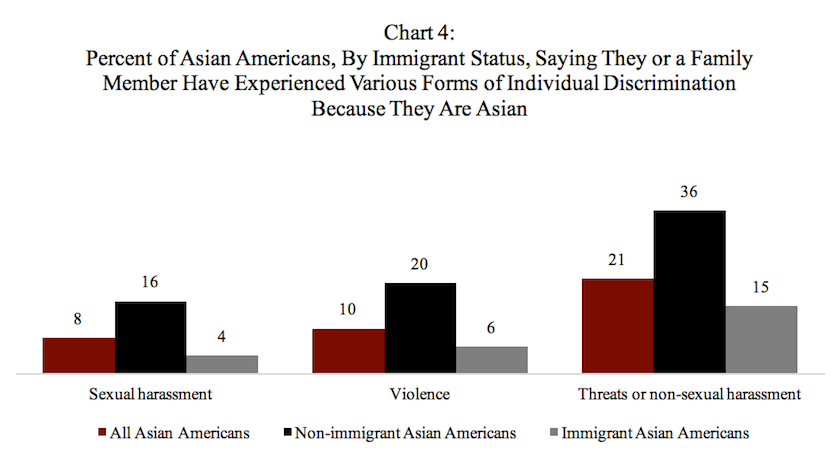For immediate release: December 4, 2017
Boston, MA – This report is part of a series titled “Discrimination in America.” The series is based on a survey conducted for National Public Radio, the Robert Wood Johnson Foundation, and Harvard T.H. Chan School of Public Health. While many surveys have explored Americans’ beliefs about discrimination, this survey asks people about their own personal experiences with discrimination.
A quarter or more of Asian Americans report personally experiencing anti-Asian discrimination in employment and when seeking housing
Chart 1 shows the overall reporting of Asian Americans’ experiences of discrimination across a range of areas of life. A quarter or more of Asian Americans report being personally discriminated against because they are Asian when it comes to applying for jobs (27%), being paid equally or considered for promotion (25%), or when trying to rent a room or apartment or buy a house (25%).

Additionally, nearly one in five Asian Americans report being discriminated against because they are Asian when applying to or while attending college (19%) or when interacting with police (18%) (Chart 1).
“Our poll shows that Asian American families have the highest average income among the groups we’ve surveyed, and yet the poll still finds that Asian Americans experience persistent discrimination in housing, jobs, and at college. Over the course of our series, we are seeing again and again that income is not a shield from discrimination,” says Robert Blendon, Richard L. Menschel Professor of Health Policy and Political Analysis at Harvard T.H. Chan School of Public Health, who co-directed the survey.
Indian Americans much more likely than Chinese Americans to report unfair police treatment
People were also asked whether they believe they or a family member had experienced unfair treatment by the police or by the court system because they are Asian. Chart 2 shows that 12% of Asian Americans say that they or a family member have been unfairly stopped or treated by the police because they are Asian. Chart 2 further shows that Indian Americans are significantly more likely (17%) than Chinese Americans (2%) to say they or a family member have been unfairly stopped or treated by the police because they are Asian.

Indian Americans are also more likely (33%) than both Chinese Americans (16%) and Southeast Asian Americans (11%) to say they live in a predominantly upper income area.
About a third of Asian Americans have experienced slurs or insensitive comments about their race or ethnicity
Chart 3 shows that 35% of Asian Americans report personally experiencing people making insensitive or offensive comments or negative assumptions about their race or ethnicity. Similarly, 32% report personally experiencing slurs because of their race or ethnicity.

Non-immigrant Asian Americans significantly more likely to report multiple forms of anti-Asian discrimination
People were asked whether they believe they or a family member had experienced sexual harassment, threats or non-sexual harassment, or violence, specifically because they are Asian. Chart 4 shows that 21% of all Asian Americans say that they or a family member have been threatened or non-sexually harassed because they are Asian. Another 10% say that they or a family member have experienced violence, and 8% say they have experienced sexual harassment because they are Asian.
Chart 4 further shows that non-immigrant Asian Americans are significantly more likely than immigrant Asian Americans to say they have experienced these forms of discrimination. For example, non-immigrant Asian Americans are four times more likely (16%) than immigrant Asian Americans (4%) to report that they or a family member have experienced sexual harassment because they are Asian.

Additionally, non-immigrant Asian Americans are more than three times as likely (20%) as immigrant Asian Americans (6%) to say they have experienced violence because they are Asian, and more than twice as likely to say they have been threatened or non-sexually harassed because they are Asian (36% non-immigrant, 15% immigrant) (Chart 4).
Nearly one in five low-income Asian Americans avoid medical care due to concern they will be discriminated against because they are Asian
As shown in Chart 1, 13% of all Asian Americans say they have been personally discriminated against because they are Asian when going to a doctor or health clinic. Additionally, nearly one in ten (9%) Asian Americans say they have avoided going to a doctor or seeking health care out of concern that they would be discriminated against or treated poorly because they are Asian.
Low income Asian Americans (those earning less than $25,000 per year) are nearly four times more likely than high income Asian Americans (those earning $75,000 or more per year) to report avoiding medical care due to concern for discrimination: 19% of low income Asian Americans report this behavior, compared to only 5% of high income Asian Americans.
Survey Background
The survey was conducted January 26 – April 9, 2017, among a nationally representative, probability-based telephone (cell and landline) sample of 3,453 adults age 18 or older. The survey included nationally representative samples of African Americans, Latinos, Asian Americans, Native Americans, as well as white Americans; men and women, and LGBTQ adults. This report presents the sample of 500 Asian American U.S. adults. Other reports analyze each other group, and the final report will discuss major highlights from the series.
“Southeast Asian American” includes respondents who said their families are Filipino, Vietnamese, Cambodian, Laotian or Malaysian. “Chinese Americans” refers to Asian Americans of Chinese heritage, but not those who identified as Taiwanese. Asian Americans who say their families are from the Indian subcontinent are referred to as “Indian American,” not to be confused with Native Americans, whose experiences are covered in a separate report in this series. These three groups (Southeast Asian, Chinese, and Indian) are not exhaustive of the entire Asian American sample. Individuals from other subgroups (e.g., Taiwanese Americans) are included in the total sample (“All Asian Americans”) but are not analyzed separately due to insufficient sample size.
For more information:
Todd Datz
617.432.8413
tdatz@hsph.harvard.edu
Visit the Harvard Chan School website for the latest news, press releases, and multimedia offerings.
###
Harvard T.H. Chan School of Public Health brings together dedicated experts from many disciplines to educate new generations of global health leaders and produce powerful ideas that improve the lives and health of people everywhere. As a community of leading scientists, educators, and students, we work together to take innovative ideas from the laboratory to people’s lives—not only making scientific breakthroughs, but also working to change individual behaviors, public policies, and health care practices. Each year, more than 400 faculty members at Harvard Chan School teach 1,000-plus full-time students from around the world and train thousands more through online and executive education courses. Founded in 1913 as the Harvard-MIT School of Health Officers, the School is recognized as America’s oldest professional training program in public health.
